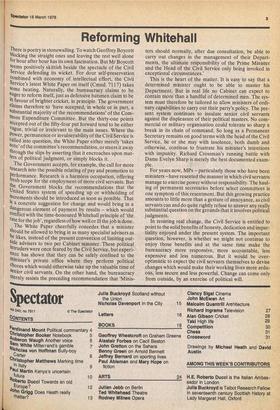Reforming Whitehall
There is poetry in stonewalling. To watch Geoffrey Boycott blocking the straight ones and leaving the rest well alone for hour after hour has its own fascination. But Mr Boycott seems positively skittish beside the spectacle of the Civil Service defending its wicket. For dour self-preservation combined with economy of intellectual effort, the Civil Service's latest White Paper on itself (Cmnd. 7117) takes some beating. Naturally, the bureaucracy claims to be eager to reform itself, just as defensive batsmen claim to be M favour of brighter cricket, in principle. The government Claims therefore to `have accepted, in whole or in part, a substantial majority of the recommendations' of the Com mons Expenditure Committee. But the thirty-one points accepted out of the fifty-four put forward tend to be either vague, trivial or irrelevant to the main issues. Where the Power, permanence or invulnerability of the Civil Service is called into question, the White Paper either merely 'takes note' of the committee's recommendation, or steers it away through the slips by asserting that it encroaches upon matters of political judgment, or simply blocks it. The Government accepts, for example, the call for more research into the possible relating of pay and promotion to Performance. Research is a harmless occupation, offering h'esh scope for the employment of more civil servants. But the Government blocks the recommendations that the ynited States system of speeding up or withholding of Increments should be introduced as soon as possible. That Is a concrete suggestion for change and .would bring in a dangerous element of payment by results — which would conflict with the time-honoured Whitehall principle of 'the rate for the job', regardless of how well or ill the job is done. The White Paper cheerfully concedes that a minister Should be allowed to bring in as many specialist advisers as he likes, instead of the present convention of limiting outSide advisers to two per Cabinet minister. These political Intruders were once feared by the Civil Service, but experience has shown that they can be safely confined to the Minister's private office where they perform political Chores which would otherwise take up the valuable time of senior civil servants. On the other hand, the bureaucracy sternly resists the preceding recommendation that 'Minis..., ters should normally, after due consultation, be able to carry out changes in the management of their Departments, the ultimate responsibility of the Prime Minister and the Head of the Civil Service only being invoked in exceptional circumstances.'
This is the heart of the matter. It is easy to say that a determined minister ought to be able to master his Department. But in real life no Cabinet can expect to contain more than a handful of determined men. The system must therefore be tailored to allow ministers of ordinary capabilities to carry out their party's policy. The present system continues to insulate senior civil servants against the displeasure of their political masters. No commercial or military organisation could tolerate so sharp a break in its chain of command. So long as a Permanent Secretary remains on good terms with the head of the Civil Service, he or she may with insolence, both dumb and otherwise, continue to frustrate his minister's intentions with impunity. Richard Crossman's running battle with Dame Evelyn Sharp is merely the best documented example.
For years now, MPs — particularly those who have been ministers — have resented the manner in which civil servants manage to exercise power without responsibility. The hauling of permanent secretaries before select committees is one symptom of this resentment. But this growing practice amounts to little more than a gesture of annoyance, as civil servants can and do quite rightly refuse to answer any really substantial question on the grounds that it involves political judgments.
In resisting real change, the Civil Service is entitled to point to the solid benefits of honesty, dedication and impar tiality enjoyed under the present system. The important question, however, is whether we might not continue to enjoy those benefits and at the same time make the bureaucracy more responsive, more accountable, less expensive and less numerous. But it would be overoptimistic to expect the civil servants themselves to devise changes which would make their working lives more arduous, less secure and less powerful. Change can come only from outside, by an exercise of political will.


































 Previous page
Previous page